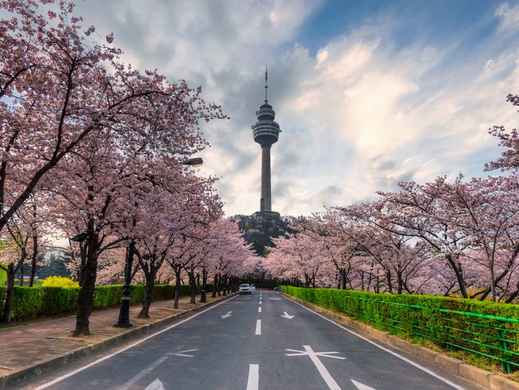


Pyeongchang
Asia
/
South Korea
/
Pyeongchang
Pyeongchang, located in Gangwon Province, is renowned for hosting the 2018 Winter Olympics and is celebrated for its stunning national parks, historic temples, and living history museums. To experience early 20th-century life, visit the Lee Hyo-seok Culture Village, a living museum dedicated to the poet Lee Hyo-seok and the early 1900s era. The county is also home to several historic Buddhist temples, with Woljeongsa Temple being particularly notable. This ancient temple features a striking 9-story octagonal pagoda and is surrounded by a serene fir tree forest, offering a glimpse into traditional Korean architecture and nature. For a peaceful retreat, head to Herbanara Farm in Heungjeong Valley. The farm showcases seven themed gardens, each with a variety of native and exotic plants, perfect for a leisurely stroll. Families can enjoy a day of fun at Ocean 700 water park, which boasts exciting rides, water slides, a wave pool, and various food and entertainment options. Additionally, Wellhillipark features the Hyundai Sungwoo Resort, which transforms from a ski resort in winter to a water park in summer, and offers scenic hiking trails for year-round enjoyment.

Explore Pyeongchang
Create your itinerary with our top picks below

Travel Tips for Pyeongchang
What you need to know before traveling here
Getting Around Pyeongchang
A guide to Pyeongchang's local transportation
Pyeongchang operates a local bus system connecting major attractions and neighborhoods. While convenient, the frequency of buses might be limited, especially in off-peak seasons.
Practical Tips for Pyeongchang
Things to prepare and best way to visit
The most efficient and fastest way to travel from Seoul to Pyeongchang is by train. South Korea's high-speed rail network offers a comfortable and swift journey. The Korea Train Express (KTX) provides a fast and scenic ride through the Korean countryside, with the trip taking about 1.5 hours. For a more economical option, the Mugunghwa train offers a slower, but budget-friendly alternative, allowing you to enjoy the views along the way. Budget travelers might consider taking a bus to Pyeongchang. Although it may take a bit longer—around 2 hours depending on traffic—it is a cost-effective choice. Buses typically depart from Dong Seoul Bus Terminal. For those who prefer flexibility and wish to explore the area at their own pace, renting a car is a great option. It allows for visits to less accessible attractions and offers a scenic drive, though be prepared for potential traffic and parking issues in popular areas.
Pyeongchang offers a variety of activities throughout the year, catering to outdoor enthusiasts and those interested in cultural and historical experiences. In the summer, Phoenix Pyeongchang features a water park and championship golf course, while Wellihillipark offers a summer water park and hiking trails. For water fun, Peak Island has both indoor and outdoor waterslides and pools, while Blue Canyon Water Park provides a range of rides, swimming, and relaxation options. During the winter, Pyeongchang is renowned for its ski resorts. Gariwangsan offers alpine skiing trails through scenic woods. Phoenix Pyeongchang and Wellihillipark transform into major ski resorts with challenging slopes and comfortable lodges. History buffs will appreciate Wojeongsa Temple and the surrounding Fir Tree Forest, which includes a historic pagoda and Buddhist temple amidst majestic trees. Lee Hyo-seok Culture Village offers a living museum dedicated to the early 20th-century poet Lee Hyo-seok, with historic buildings, shops, and eateries that reflect the era.
Dining in Pyeongchang highlights local specialties, including buckwheat dishes and Hanwoo beef, a premium Korean beef similar to Japanese wagyu. Popular barbecue spots like Darae Hanwoo and Daegwallyeong Hanwoo Jinbu serve this exquisite beef. Buckwheat is featured in various dishes, from traditional buckwheat pancakes to unique buckwheat jelly soups and rice balls seasoned with thistle. The Olympic Market is a great place to explore local delicacies. For a taste of local cafe culture, visit Gangneung Coffee Street, where you can enjoy excellent espresso, pastries, and local art.
Pyeongchang offers a range of shopping experiences, from traditional markets to modern malls. Jinbu Traditional Market is a notable spot where you can find daily necessities, agricultural products, and local specialties, evoking a nostalgic atmosphere. For a contemporary shopping experience, Bau Farmers' Mall is a trendy destination featuring a variety of agricultural and livestock products, as well as processed goods. Drakon Avenue, Korea’s first drama-themed shopping mall, provides a unique shopping experience with its themed attractions.
Winter is the prime season for visiting Pyeongchang, particularly for winter sports, with the season running from November to late February. January and February are the peak months, coinciding with student vacations and the Lunar New Year. Alternatively, a summer visit can be pleasant, with Gangneung’s beaches just a short drive away offering a respite from the humid Korean summer.

Get to Know Pyeongchang
Take a tour of this destination's highlights

Explore Pyeongchang

Travel Tips for Pyeongchang

Get to Know Pyeongchang
























 Facebook
Facebook Instagram
Instagram TikTok
TikTok Youtube
Youtube Twitter
Twitter Telegram
Telegram WhatsApp
WhatsApp
